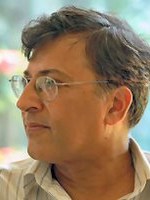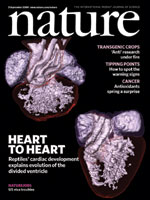Adil Najam

 Dr. Pervez Hoodbhoy, one of Pakistan’s pre-eminent intellectuals and someone who I and ATP holds in the highest esteem (here and here), has written a letter to the editors of Nature in response to the recent article (of which I was a co-author) on Pakistan’s higher education reform experiment.
Dr. Pervez Hoodbhoy, one of Pakistan’s pre-eminent intellectuals and someone who I and ATP holds in the highest esteem (here and here), has written a letter to the editors of Nature in response to the recent article (of which I was a co-author) on Pakistan’s higher education reform experiment.
I just wrote to Pervez requesting that in the interest of greater discussion on this important issue, he allow us to reproduce the letter here at ATP. He has graciously agreed.
We reproduce his letter, in full, here:
“Pakistan’s Reform Experiment” (Nature, V461, page 38, 3 September 2009) gives the impression of providing a factual balance sheet of Pakistan’s higher education under General Pervez Musharraf’s former government. Unfortunately, several critical omissions indicate a partisan bias.
Mention of the billions wasted on mindless prestige mega-projects is noticeably absent. Example: nine new universities were hastily conceived and partially constructed, but abandoned and finally scrapped after it became obvious that it was impossible to provide them with the most crucial ingredient – trained faculty. Similarly, fantastically expensive scientific equipment, imported with funds from the Higher Education Commission, remain hopelessly under-utilized many years later. They litter the country’s length and breadth. For instance, my university has been forced to house a “souped-up” Van de Graaf accelerator facility, purchased in 2005 with HEC funds. A research purpose is still being sought in 2009.
The authors conveniently choose not to mention that the 400% claimed increase in the number of publications was largely a consequence of giving huge payments to professors for publishing in international journals, irrespective of actual substance and quality. Not surprisingly these cash-per-paper injections had the effect of producing a plagiarism pandemic, one that is still out of control. In a country where academic ethics are poor and about a third of all students cheat in examinations, penalties for plagiarism by teachers and researchers are virtually non-existent.
Citing Thomson Scientific, the authors claim a large rise in the “relative impact” in some disciplines, based upon citation levels of papers published between 2003 and 2007. But did the authors try to eliminate self-citations (a deliberate ploy) from this count? If they had – as I did using an available option in the Thomson Scientific package – they might actually have found the opposite result.
While the authors laud the increase in the salaries of university professors by the HEC, they pay no attention to the disparities thus created. The salary of a full professor (after the raises) can be 20-30 times that of an average Pakistani school teacher. Money raining down from the skies has created a new dynamic as well. Naked greed is now destroying the moral fibre of Pakistan’s academia. Professors across the country are clamoring to lift even minimal requirements that could assure quality education.
This is happening in three critical ways. First, given the large prospective salary raises, professors are bent upon removing all barriers for their promotions by pressuring their university’s administration as well as the HEC. Second, they want to be able to take on more PhD students, whether these students have the requisite academic capacity or not. Having more students translates into proportionately more money in each professor’s pocket. Third, a majority wants the elimination of all international testing – such as the Graduate Record Examination administered from Princeton. These had been used as a metric for gauging student performance within the Pakistani system.
Pakistan’s failed experiment provides a counter example to the conventional wisdom that money is the most important element. Instead, an enormous cash infusion, used badly, has served to amplify problems rather than improve teaching and research quality. There is much that other developing countries can learn from our experience – and it is opposite to what the authors want us to conclude.
Dr. Hoodbhoy is a leading voice on science and education policy and has been the most prominent critic of the Pakistan Higher Education Commission (HEC) over the years. Personally, I can think of few who have been more committed to Pakistan’s higher education than him. For all of these reasons, I take his opinions very seriously, even when my own assessment might end up to be different from his, as it has been in this case
Since we have made our case in print and he has too, I will not go into rebuttals. Nor is that possible since the co-authors have not yet had a time to carefully and and collectively respond to this (the group was large, spread out across the globe, and deliberately structured to be diverse). But speaking strictly for myself, there are a number of points I would not disagree with (For example, in our article we have also been critical – although maybe not as much as Pervez would have liked us to be – of the domestic PhD program and the consequences of the incentives given). But that would not change my overall assessment. Our goal, as we saw it, was to look at the entirety of Pakistan’s higher education reform effort and, as honestly and as best as we could, to arrive at a collective assessment of the total impact (the good as well as the bad) in the very limited space we had.
Where our assessment does differ from Dr. Hoodbhoy’s, I think, is that while he clearly believes the Pakistan reform experiment to have “failed,” we believe that it is “too early to judge the outcome” but that some aspects of the experiment have and will give much better results than others. Where we do not differ is that like him (and I take the liberty of quoting from his email to me) we too “feel rather strongly on what’s needed for fixing our universities.” Our assessments may differ, but our goal is the same.
Importantly, we also agree that (and, again, I quote from his email), “its important to debate such issues.” It is in that spirit that I had asked Pervez to let us share his response here. A focus on how best to improve higher education in Pakistan is the core of all of our concerns, and was also the core of our recommendation in the paper “for an independent peer review of the HEC’s performance.” I hope that our readers can also help all of us focus much more on this very question which motivates all of us, Dr. Hoodbhoy, myself, and my co-authors: what is it that we have learnt so far and what is it that we should do in the future to strengthen and improve higher education in Pakistan.



















































PharmaLibre France [url=http://pharmalibrefrance.com/#]commander kamagra en toute confidentialite[/url] kamagra en ligne France sans ordonnance
pharmacie digitale francaise fiable: medicaments generiques et originaux France – Pharmacie sans ordonnance
viagra homme: BluePharma – pilule bleue en ligne
https://pharmalibrefrance.shop/# Pharma Libre
acheter medicaments en ligne pas cher: pharmacie en ligne – pharmacie en ligne livraison europe